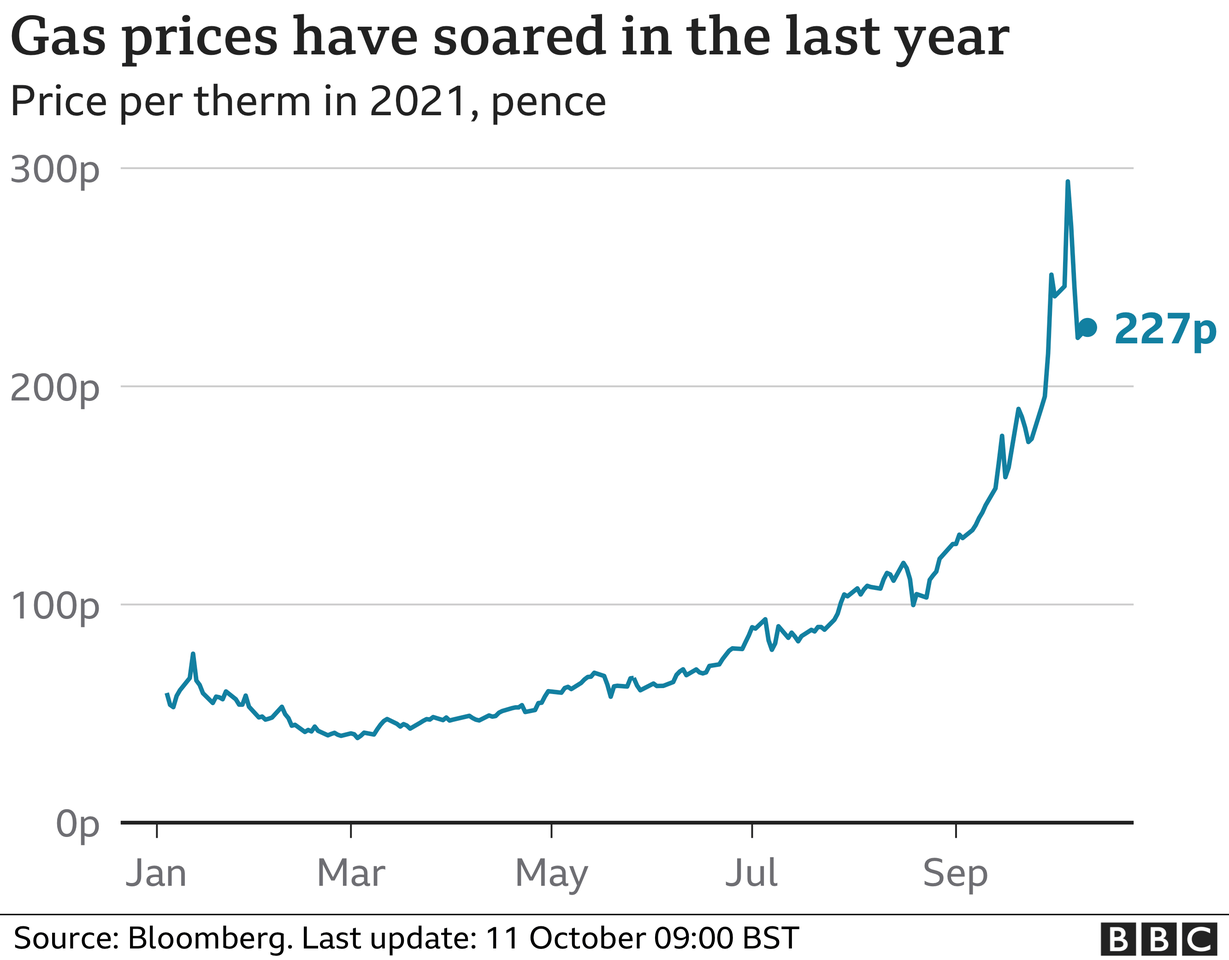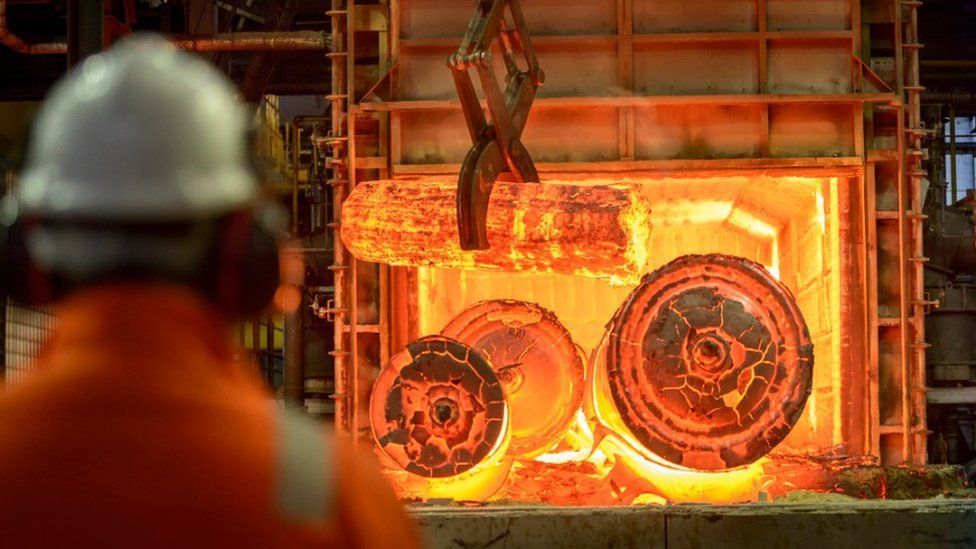
Gas price rises: Kwarteng asks Treasury to help firms over cost
Kwasi Kwarteng's formal request follows talks between ministers and industry leaders.
The details have not been disclosed, but they are thought to focus on a temporary solution to high prices.
Sectors such as steel manufacturing have called for a price cap amid fears for the survival of some factories.
There are a number of reasons for a steep rise in gas prices over the past year - including the reopening of industry after Covid lockdowns.
A source told the BBC that "everyone in government understands the importance of this situation".
"We need to solve this quickly," they added.
Mr Kwarteng's proposal follows confusion over the weekend, when his claim to be in talks with the chancellor about potential support was disputed by a Treasury source.
On Monday, the prime minister's spokesman said Treasury officials were involved in talks with the Department for Business, Energy and Industrial Strategy (BEIS).
"As you would expect, ministers from BEIS are working across government, including with the Treasury, on this important issue, the challenges currently facing industry in light of global gas prices, and that will continue," he said.

Darren Jones, Labour MP and chairman of the Commons BEIS committee, welcomed Mr Kwarteng's request for help and stressed the importance of finding short-term solutions.
He said a one-off windfall tax on gas producers was worth considering, because they had "made significant profits" during recent price fluctuations.
But he also said the UK should be focusing more and renewable energy sources and nuclear.
"Any subsidy from government should be on proviso that we bring forward, both from private and public sector, investment to move away from gas powered sources of energy to avoid these problems in the future," he added.
Dr Richard Leese, chairman of the Energy Intensive Users' Group which represents manufacturers, welcomed Mr Kwarteng's "urgency" and said he hoped for an "equally swift response" from the Treasury.

There have been bleak warnings about the potential impact of the spiralling energy price.
One government source warned of factories closing forever, and thousands of job losses as a result.
But despite that, ministers have struggled to maintain a united front over the past day.
When the business secretary told the BBC he was in talks with the chancellor, a Treasury source said he was wrong.
With the prime minister on holiday, it was left to his team to insist today that ministers were working across government to find solutions.
Tonight we have some clarity - the business secretary has made formal proposals. A source said an urgent solution was needed.
It's now up to the Treasury to decide whether to accept them.
BBC political correspondent Adam Fleming said earlier that business minister Lee Rowley, rather than Mr Kwarteng, was due to lead Monday's meeting - and would lead another with steel bosses on Tuesday.
Ministers also met industry leaders on Friday.
Dave Dalton, chief executive of the British Glass trade body called for "immediate action" following that meeting.
He said some members of his group might have to shut production permanently, although no firm had been forced to do so yet.
Adrian Curry, managing director of UK-based Encirc, one of the largest container glass plants in Europe, said industry was not asking for a bailout, but the situation for some companies was critical.
"We pay more for our energy than competitors in other countries," he told the BBC. He said his company would normally spend £40m a year on energy, but was now looking at bills up to £100m.
Why are gas prices so high?
There are many reasons, both in the UK and around the world.
There's been a shortage of gas and energy in many countries as they emerged from lockdown and industry reopened.
A cold winter in Europe last year also put pressure on supplies and, as a result, less gas is being stored than normal.
On top of that, the UK has fewer gas storage facilities than some countries - meaning it buys more on the wholesale market and is exposed to sharp price rises.
There's also increased demand from Asia (which also suffered a cold winter) for liquefied natural gas. And there is a suspicion that Russia, a major gas supplier, is restricting output - an accusation it denies - which, following the law of supply and demand, has fuelled price rises.
This has helped push up gas prices in the UK, Europe and Asia. Since January, they've risen 250%. And prices have soared 70% since August alone.
Trade group UK Steel told the BBC that Boris Johnson needed to take control before it was too late - although it described as "really good news" an announcement that the country's third largest steel maker, Liberty Steel, would restart operations at its plant in Rotherham this month.
The Unite union also called on the prime minister to "get a grip" to avert job losses if companies had to shut production because they could not cope with the increased cost of energy.
Downing Street has said Boris Johnson is continuing "to address the current issues around fuel and supply chains" while on holiday, after Labour accused the government of having "put its out of office on" over the weekend.
However, Conservative MP Mark Harper said the government should resist demands for financial support.

Domestic energy consumers have a certain amount of protection from rising prices due to a price cap, which sets the maximum price suppliers in England, Wales and Scotland can charge customers on a standard - or default - tariff.
However, the cap was increased on 1 October, meaning about 15 million households face a 12% rise in energy bills.
Industry has no such cap, meaning they are open to the risk of an unlimited rise in prices.
Already manufacturers and services are warning they will have to pass on their rising costs to consumers. And as energy costs are a big driver of inflation, few consumers and households will escape the consequences of the current crisis.










